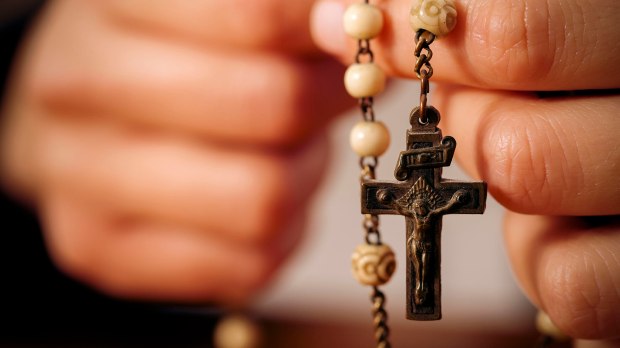39) Pray a novena for the good of someone you dislike.—56 Ways to Be Merciful During the Jubilee Year of Mercy
Novenas are back. If you are a young enough Catholic, or a recent convert drawn to traditional Catholic practices, of course, novenas never left. But for those my age, growing up in the 1960s, novenas – like thick support stockings and battered black Sunday hats – were the exclusive province of little old Irish and Italian ladies.
I’m glad this devotional tradition is popular again, and glad that – like Adoration of the Blessed Sacrament – novenas are newly accessible to people of all ages and liturgical tastes.
If this week’s suggestion for practicing mercy in the Jubilee Year – Pray a novena for the good of someone you dislike – leaves you quizzical, however, here are a some background notes.
What’s a novena, anyway?
The word novena comes from novem, the Latin word for 9. For Catholics (as well as Episcopalians, Eastern Christians, and some Lutherans), a novena is a prayer or series of prayers repeated for nine days in a row. The roots of the tradition are scriptural, referring to the nine days the Apostles and Our Lady spent in the Upper Room between Jesus’ return to his Father and the coming of the Holy Spirit. Acts 1:12-14 tells us they “were constantly devoting themselves to prayer.”
Novenas began as clerical or monastic prayers prayed in common for nine days before a feast. In the 19th century, one of the most popular novenas — the Novena to Our Mother of Perpetual Help, promoted by the Redemptorist Fathers – was composed for lay participation. Using novenas in private prayer grew from there.
Whether communal or in private, novena prayers are always marked by a sense of urgency and focus. This is not just daily prayer, but purposeful attention to intense, heartfelt, and repeated prayer of petition. Novenas are prayed for something specific, by someone specific. Many novena prayers contain places for the petitioner to mention his or her need, to place it personally in the hands of Our Lord, Our Lady, or the saint invoked.
What a novena is not
Novenas are not magic spells or incantations. That’s an easy mistake to make if we’re not careful. Because novena prayers are part of tradition of asking for divine assistance in times of worry, danger, or stress, you will sometimes hear people talking about which novenas “work” best, as though they were recipes for God’s intervention. That’s superstition, not prayer. What “works” when we pray a novena is that we ourselves are changed by the experience of yielding our need and our will to God with such intensity and specificity. The knotty problem, the nagging suffering may not (and often will not) disappear, but with God’s help and the intercession of the saints we may be granted the grace and mercy to bear it.
Another thing a novena is not – and this is particularly important to keep in mind when practicing this week’s suggestion for living mercifully – is a voodoo doll. A novena, like a rosary or any other prayer, can indeed be weaponized, but only against the Enemy, the author of evil. The power of a novena cannot be underestimated. But that power must never be leveled against a person. If you hear Catholics say that their novena prayers have been responsible for a newspaper’s firing writers they don’t agree with, or for the visible ill health of politicians, pay them no mind.
That’s not how it works, thank God.
For the good of someone I dislike
I can’t say I’ve never been tempted to try the voodoo doll novena, when I believe the source of my stress or fear or suffering is someone else. I might even be able to convince myself for a minute or two that it would truly be for the good of this deplorable someone to receive a divine slap upside the head. But we are talking here about putting mercy into practice, and I am finding that mercy and the dark glee of shadenfreude are utterly incompatible.
What might happen if I were to commit to praying for the good of this pain in the patootie for nine consecutive days? God might hear my prayer. God might shower this undeserving person with tender abundance and joy – and then I’d have to go to confession for the sin of envy. But seriously, I might begin to see this person differently. I might begin to wish for both of us goodness and healing and peace. And in praying for it for him or her, I might open my heart enough to receive the mercy of it for myself, too.
I don’t even have to make it through nine days, if my anger and hurt make that seem impossible. Saint Teresa of Calcutta, who was nothing if not efficient with time in the doing of good, recommended praying a novena of 9 consecutive Memorares when the need was urgent. My German mother-in-law, who practiced every devotion known to Christendom, taught me the efficacy of what she called her “storm novena”: 9 consecutive minutes (or even seconds, if that’s all you had) of extreme, extreme prayer. I think we used it to wish each other good many a time, to great success.
Places to start
If you’re unused to praying novenas, you’ll find many fine resources available. Online, Jon-Paul and Annie Deddens (no little old Irish ladies, they!) run Pray More Novenas, a novena community with many forms to choose from. Loyola Press offers Novenas: Prayers of Intercession and Devotion. This prayerbook contains traditional selections as well as contemporary novenas, including Pope Francis’ favorite Novena to Our Lady Undoer of Knots.
Traditionally, we Catholics pray a novena for our own intentions. Putting someone else’s good first – especially someone we dislike – can’t help but make a merciful difference in our lives.

